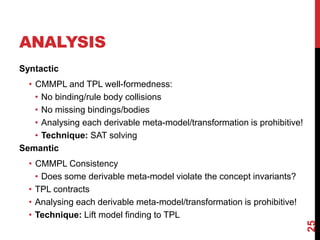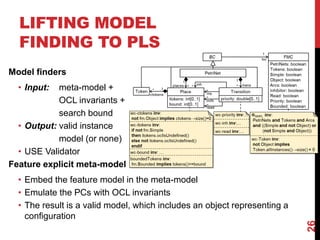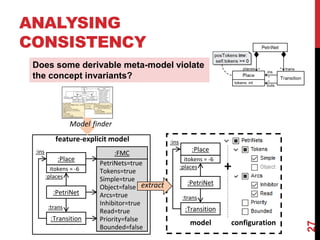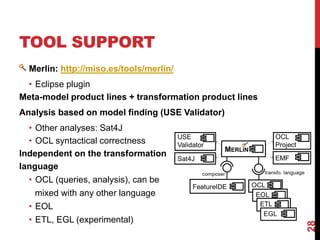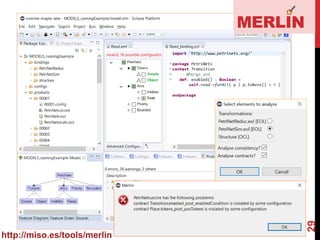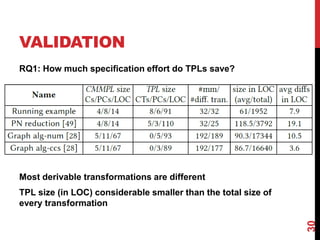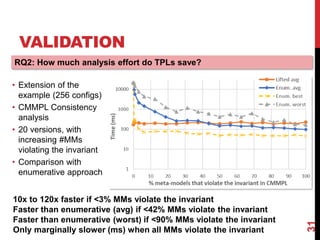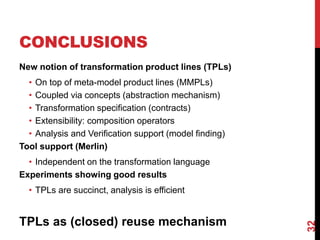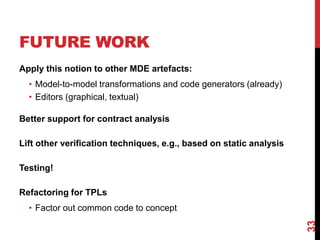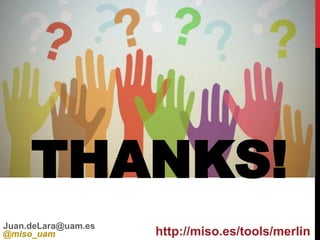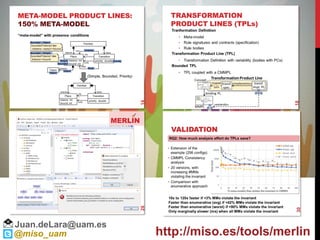The document discusses developing a transformation product line (TPL) approach to define model transformations over variants of a meta-model product line (MMPL) in a compact, reusable, extensible, and analyzable way by using transformation fragments with presence conditions and composing them through abstraction and overriding mechanisms. It aims to address the challenges of defining transformations over many variants of a meta-model in a scalable way while maintaining correctness through analysis at the TPL level.
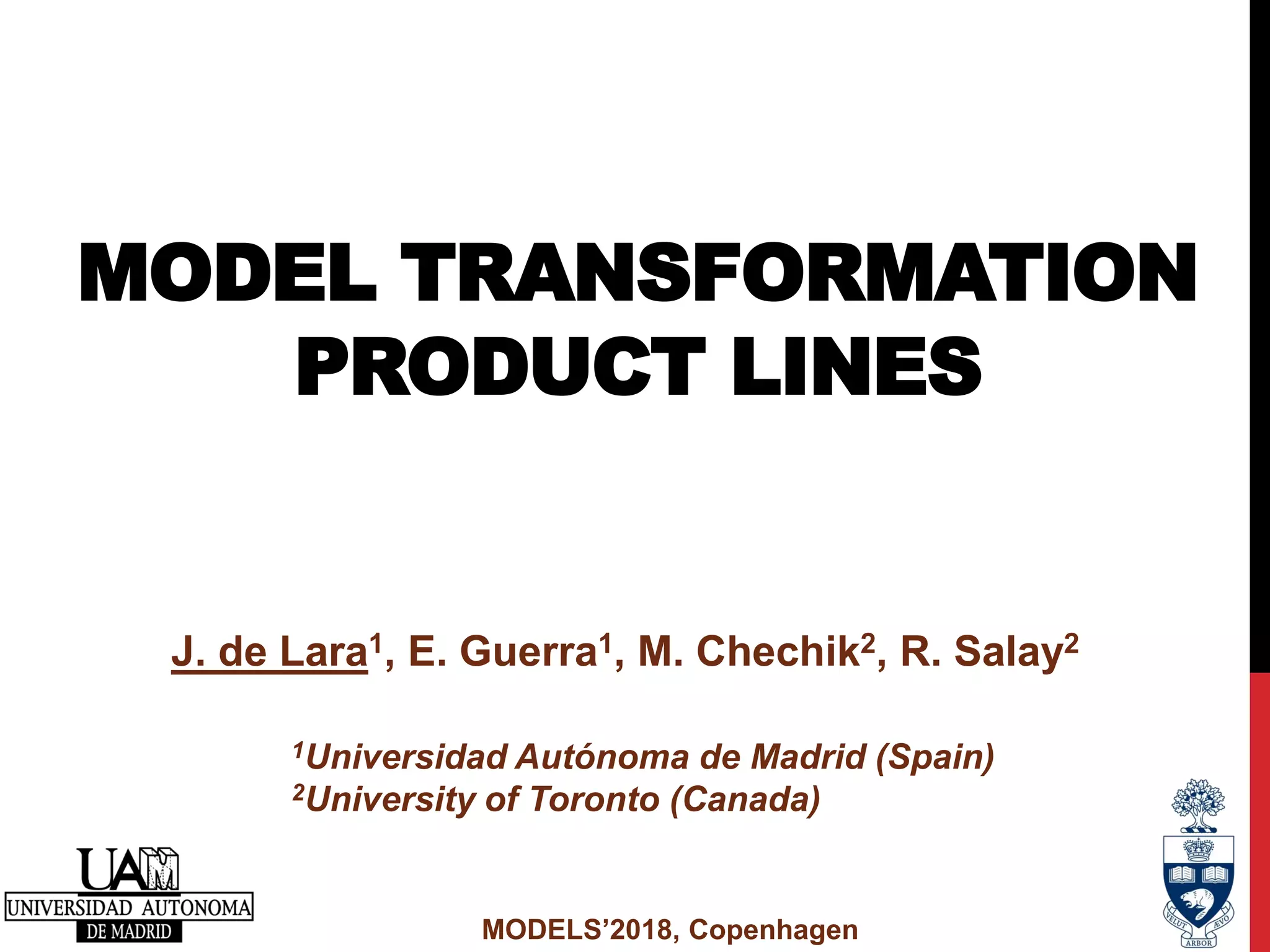
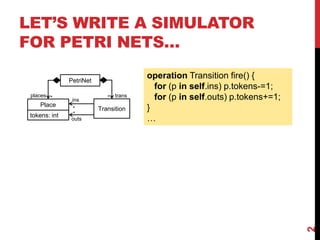
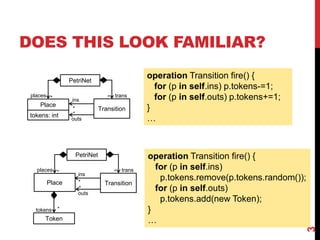
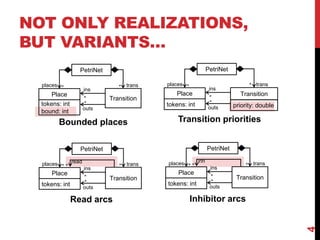
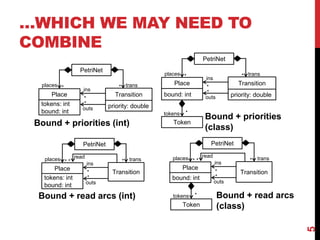
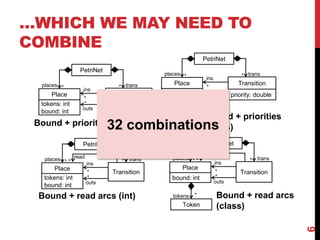
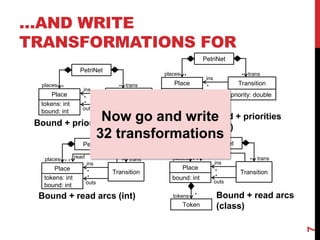
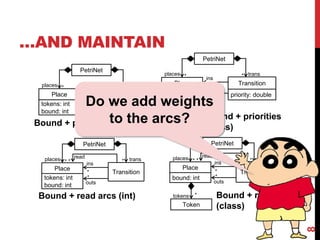

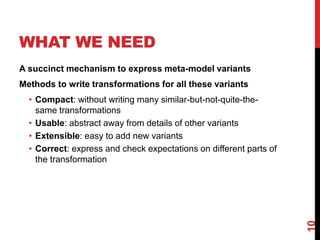
![OUR CONTRIBUTION
11
A notion of transformation product line (TPL), which is:
• Compact: transformation fragments, annotated with their activation
(presence) conditions
• Usable: abstraction mechanism that hides details (concepts)
• Extensible: by composition operators
• Correct: by profiting from (OCL) contracts and analysis methods
based on model finding
Building on a notion of meta-model product line (MMPL) [GLCS18]
Tool support: Merlin
Experiments that show the benefits of analysis at the TPL level
[GLCS18] Guerra, de Lara, Chechik, Salay. 2018.
Analysing Meta-Model Product Lines. Proc. SLE, pp.: 171-184.](https://image.slidesharecdn.com/mtpls-181017195923/85/MTPLs-11-320.jpg)
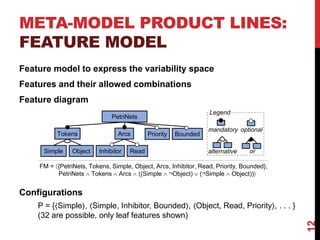
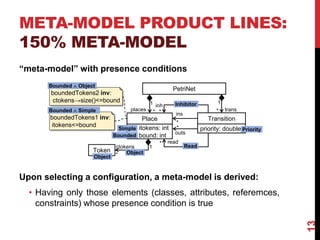
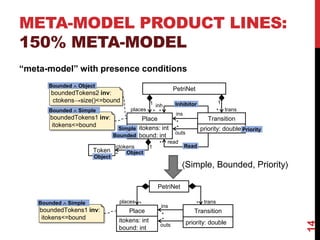
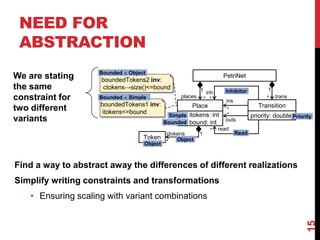
![CONCEPTUAL MMPLs
Make uniform the 150% meta-model
Concept on top of the 150% meta-model
• A canonical representation of common elements
• Binding to different variants
Express expectations on the different variants (constraints)
16
ins
Place
tokens: int
PetriNet
Transition
outs
places * trans*
*
*
posTokens inv:
self.tokens >= 0
PetriNet
+places(): Place[*]
+trans(): Transition[*]
Place
+tokens(): int
Transition
+ins(): Place[*]
+outs(): Place[*]
posTokens inv:
self.tokens() >= 0
](https://image.slidesharecdn.com/mtpls-181017195923/85/MTPLs-16-320.jpg)
![context PetriNet
def: places() : Place[∗] = self.places
def: trans() : Transition[∗] = self.trans
context Transition
def: ins() : Place[∗] = self.ins
def: outs() : Place[∗] = self.outs
context Place
[Simple] def: tokens() : Integer = self.itokens
[Object] def: tokens() : Integer = self.ctokens→size()
PL OF BINDINGS
17
Constraints and transformations are written against the concept
Now we can write one constraint, instead of two (with simpler PC):
context Place
[Bounded] inv boundedTokens: self.tokens()<=bound
PetriNet
+places(): Place[*]
+trans(): Transition[*]
Place
+tokens(): int
Transition
+ins(): Place[*]
+outs(): Place[*]
posTokens inv:
self.tokens() >= 0](https://image.slidesharecdn.com/mtpls-181017195923/85/MTPLs-17-320.jpg)
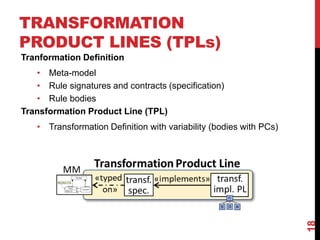
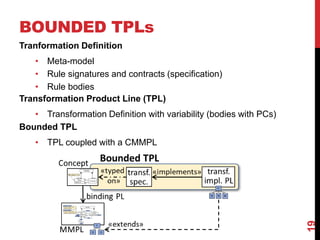
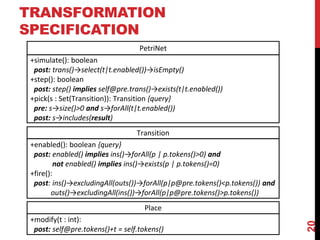
![TPL EXAMPLE
21
operation PetriNet step() : Boolean {
var enabledTrans = self.trans()->select(enabled());
if (enabledTrans->isEmpty()) return false;
else return self.pick(enabledTrans).fire() ;
}
[Simple] operation Place modify(t : Integer) {
self.itokens += t;
}
[Object] operation Place modify(t : Integer) {
if (t>0)
for (i in Sequence{1..t})
self.ctokens.add(new Token);
else if (t<0)
for (i in Sequence{1..-t})
self.ctokens.remove(self.ctokens.random());
}](https://image.slidesharecdn.com/mtpls-181017195923/85/MTPLs-21-320.jpg)
![EXTENDING TPLs
22
context PetriNet
[not Priority] def: pick(s: Set(Transition)): Transition= s→any(true)
[Priority] def: pick(s: Set(Transition)): Transition=
s→any(t | not s→exists(t1| t1.priority>t.priority))
context Transition
[not (Inhibitor or Read or Bounded)]
def: enabled() : Boolean = self.ins()→forAll(tokens()>0)
[Inhibitor and not (Read or Bounded)]
def: enabled() : Boolean = self.ins()→forAll(tokens()>0) and
self.inh→forAll(tokens()=0)
[Inhibitor and Read and not Bounded]
def: enabled() : Boolean = self.ins()→forAll(tokens()>0) and
self.inh→forAll(tokens()=0) and
self.read→forAll(p.tokens()>0)
… (5 more combinations ommited)
Still difficult to extend!](https://image.slidesharecdn.com/mtpls-181017195923/85/MTPLs-22-320.jpg)
![COMPOSING RULE BODIES
OVERRIDING
Override: declares precedence among rule bodies
• Default (super): more specific body overrides more general body
• Other semantics: subs, all
23
context PetriNet
def: pick(s: Set(Transition)): Transition =
s→any(true)
context PetriNet
[Priority]
−− @Override super
def: pick(s: Set(Transition)): Transition=
s→any(t | not s→exists(t1| t1.priority>t.priority))](https://image.slidesharecdn.com/mtpls-181017195923/85/MTPLs-23-320.jpg)
![Merge operators depending on rule signature
• and/or for boolean queries, union/intersection for collections
• Arithmetical operations for queries returning numbers
• Sequential composition of actions for operations changing state
24
context Transition
def: enabled(): Boolean = ins()→forAll(tokens()>0)
COMPOSING RULE BODIES
MERGE
context Transition
−− @Merge and
[Inhibitor] def: enabled(): Boolean = inh→forAll(tokens()=0)
context Transition
−− @Merge and
[Read] def: enabled(): Boolean = read→forAll(tokens()>0)
context Transition
−− @Merge and
[Bounded] def: enabled(): Boolean=outs()→forAll(tokens()<bound)
4combinations
insteadof8](https://image.slidesharecdn.com/mtpls-181017195923/85/MTPLs-24-320.jpg)
